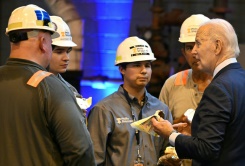
President Joe Biden on Thursday visited a shipyard symbolizing the industrial boom he hopes will put wind in his re-election campaign’s sails, even if polls show most Americans cool on him continuing as their economic captain.
The Democrat’s pitch at the Philly Shipyard in Philadelphia, Pennsylvania, was simple.
“Bidenomics is just another way of saying, ‘restore the American dream,'” he said. “This is a new day.”
What he calls “Bidenomics” revolves around bringing back manufacturing after decades of offshoring and the hollowing out of industrial towns.
It’s a strategy kickstarted by the Inflation Reduction Act, which poured almost $500 billion in spending and tax breaks into green energy, as well as other legislative wins that are funding infrastructure and semiconductor development.
The main focus of this path back to industrial might is in high-tech areas like microchips and clean energy.
At the Philly Shipyard, Biden viewed work on steel plates going into a ship for use in building ocean wind farms.
“When I think climate, I think jobs, I think union jobs,” Biden said to cheers from the audience at the shipyard. “We’re creating jobs in America and we’re exporting American products.”
More generally, Biden can point to a surprisingly strong, stable recovery from the Covid pandemic-induced slump.
Not only has the US economy defied a chorus of warnings that recession is around the corner, but the once shocking surge of inflation is being tamed and, at three percent, is already lower than in other major economies.
- Gloomy sentiment –
That’s a scenario the 80-year-old president hopes will power him to re-election next year. Not by coincidence, Pennsylvania is one of a handful of swing states that will decide the result in a close race — potentially a rematch against the man Biden defeated in 2020, Donald Trump.
The polls, though, show gloomy sentiment persisting and only a minority saying they trust Biden’s performance.
A Monmouth University poll released this week found just 34 percent approval for Biden’s handling of inflation, the most politically toxic aspect of the economy.
On jobs and unemployment — currently at just 3.6 percent — there was marginally better news for Biden. The poll found 47 percent approve of his handling in this area, but 48 percent disapprove.
And despite the statistics regularly rolled out by the White House showing the US economy leading G7 powers in recovery from the Covid pandemic era, only 30 percent of respondents thought this was the case, while 32 percent thought the US economy is doing worse than other countries.
“The president has been touting Bidenomics, but the needle of public opinion has not really moved,” Patrick Murray, director of the Monmouth University Polling Institute, said. “Americans are just not giving him a lot of credit.”
As in most other issues in the deeply divided country, Biden got high marks from Democrats but even stronger negative marks from Republicans.
White House Press Secretary Karine Jean-Pierre said patience was needed.
Jean-Pierre rattled off the achievements of “near historic lows” in the combined unemployment and inflation stats and repeated the line that the US economy is the envy of the industrialized world.
“The polls don’t tell the whole story so we’re going to continue to have that conversation,” she said.
Biden, who stopped after his speech to hand out ice cream to shipyard workers in hardhats, projected confidence, framing his economic plan as a historic chance to set the country back on course.
Projects like the wind farm ship — echoed in factories springing to life around the United States — create “a sense of pride, a sense of hope and dignity that got lost somewhere along the way,” he said.
“For the longest time, we’ve been told, ‘Give up on manufacturing in America.’ How many times have you heard or read in the paper in the last 25 years that we can never lead the world of manufacturing again? Well, we are and we will.”









